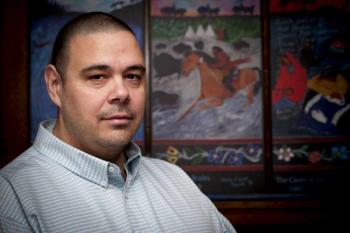Image Caption
Audio
By Brittney Pastion of CFWE-FM
Windspeaker.com Contributor
Chris Andersen, dean of Native Studies at University of Alberta, says Greyhound’s planned abandonment of bus routes in western Canada as of Oct. 31 is “extremely unfortunate… I think it’s going to be a real problem for a lot of people.”
Greyhound says declining ridership is at the root of its decision to back away from the service, “but let’s be honest. Nobody decides to take the bus because they got sick of driving their Ferrari,” said Andersen. “These are the people out there that need this kind of transportation.”
Andersen said there are some in the Indigenous community that are in a financial position where riding the bus is the best option for them.
“I remember when I used to take the bus coming back from university in Alberta here to go back home to Saskatchewan, and going back at Christmas time, and just seeing the bus just packed, packed, packed with all these people and Christmas gifts and all.”
Greyhound’s bus routes are a transportation lifeline that connects people to each other. Soon, said Andersen, people will have to make touch decisions. Whether for medical appointments or reconnecting to home and family, or to go and help family or friends, people may not be able to do the things they need to do.
“It’s a big deal.”
He said “what is particularly unfortunate about it is you’re hearing people talking about ‘Well, it’s a failed business model so it shouldn’t be up to the government to support a failed business model’.
“But this seems really ironic given the amount of money that the federal government is putting into the oil pipelines to try and get them to go through.
“I think there is certain things that we subsidize, and certain things that we don’t subsidize but should subsidize. And I think this mode of transportation is one of those things that we should be talking about, explicitly talking about, subsidizing.”
Andersen said we need to let the people in power know that this is a big problem and will have an enormous impact on people’s lives.
“Talking about it is a great idea and Twitter has been a great vehicle for that.” He said there has been many “robust conversations” on Twitter regarding options that should have been done in the past and what could be done in the future.
One comment he’s heard from Dr. Adele Perry of the University of Manitoba questions why if rail and airlines are nationalized or are a federal responsibility, why are buses a provincial responsibility?
“What kind of leadership could the federal government show in the context of ensuring that people aren’t left in the lurch by these kinds of things.”
Andersen said there should be a conversation about what kind of duty does the federal government owe to its citizens.
“Surely, it can’t just be a binary of where we either have buses or don’t have buses. That seems absolutely absurd to me,” said Andersen.
Yesterday, a statement from the Alberta government reported that Alberta Premier Rachel Notley would raise the Greyhound bus issue with the Council of the Federation next week in New Brunswick.
“Greyhound’s decision this week to suspend services throughout Western Canada significantly diminishes transportation options for hundreds of Canadians throughout our region, potentially harming the economy and quality of life for tens of thousands of people,” said Notley.
“Given its urgency, I will be raising this issue at the Council of the Federation with a view to working on common solutions with my fellow Premiers and the federal government to ensure western Canadians, particularly those living in rural areas, including many Indigenous communities, have access to the transportation services they deserve.”

